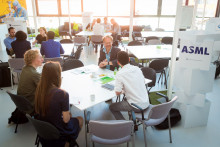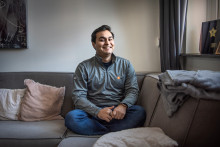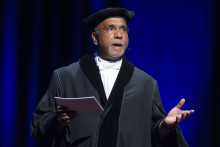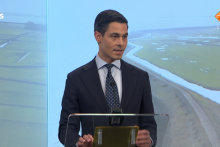After one minute pitches from the companies, it was time for face-to-face meetings between them and the UT students. Erwin Verkleij, Master’s student of Mechanical Engineering, is working on a startup called Micro-Cosmos. ‘Together with students from the University of Nijmegen, I’m working on a kind of dome that can close off a hospital bed from the rest of the room. A hospital stay is never pleasant. So our goal is to create a pleasant bubble to improve the wellbeing of patients and speed up the healing process, thereby lowering the overall costs.’
‘The feedback of the companies helped us to narrow our idea down and apply more focus.’
Verkleij sees the UT Challenge as a good opportunity to expand his network and for personal development. ‘The challenge is great for working on my skillset. In addition, the technical companies involved could help us with relevant advice and expertise. You’re allowed to make mistakes and ask them “stupid” questions, because of the confidential way we’re communicating. Right now, the contacts prove more valuable than possibly winning one of the prizes.’
38 projects left
The second edition of the UT Challenge started in February. Back then, 240 students with an entrepreneurial idea started working on a total of 129 projects. By now, it has narrowed down to 38 projects.
Biting glove
Next to Verkleij, CreaTe students Lise Pieper and Niels Kadijk have prepared a glove with a biting stick attached. They named their project ‘Biting Protection’. ‘We think we have a simple solution for people with self-harm issues,’ says Kadijk. ‘Otherwise, they would bite their hands, which could lead to wounds and infections. With our product, they can bite in the stick attached to the glove.’
Pieper says that one family has already used their prototype. ‘We had to get it back to show it during the speed dates. Afterwards we will return it. We got a lot of positive feedback from the parents, saying it really helped their child.’

Getting the timing right
Competing in the ‘Idea’ category are Atul Hari and Shrijan Kumar, both Master’s students of Systems and Control. Their project is called WTF, meaning ‘Wear the Future’. ‘We want to integrate wearable technology in big industry workplaces,’ says Hari. ‘Mainly to help make the processes more efficient. That’s why we want to provide companies with a platform that can help them monitor their workers.’ Kumar adds that those kind of statistics can be helpful in the case of hazardous situations for instance. ‘Wearable technology like smartwatches could monitor such a situation and give instant feedback if something is wrong.’
The students are enthusiastic about the advice they received from companies during the UT Challenge. ‘We started out with a much broader picture to apply wearable technology in,’ says Kumar. ‘The feedback of the companies helped us to narrow it down and apply more focus.’
Hari adds that they do want to start their own company. ‘But not at this moment or right after the UT Challenge. We think we have to wait for another three to four years for people to be accepting of a product like ours. In the end, most startups fail because of bad timing.’








